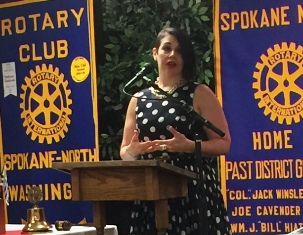WA State Bar Assoc - Robin Lynn Haynes
Posted by Charles Rehberg
Spokane North Notes
A weekly bulletin of the Spokane-North Rotary Club
April 18, 2016
Editors: Chuck Rehberg and Sandy Fink
Photo: Sandy Fink
Program Coordinator: Brad Stark
Cheers: No club luncheon on May 9. The club will gather at a central Spokane site, still to be determined, at 5:30 p.m. for a social hour, likely a wine-tasting event, said coordinator Bruce Ellwein.
Check and mate: Eagle Peak School sent four players to the state chess tournament “and they all won something,” Principal Melinda Keberle told the club. For some from the special needs school (formerly Bancroft), this was their first flight (to Seattle), Keberle said.
Procurement theme: Fund-raising coordinator Jodi Harland encouraged members to continue gathering items for gift baskets and auctions at the June 2 fund-raising dinner. Proceeds fund projects at Holmes Elementary and other schools serving West Central Spokane.
Lincoln Day “holler:” Stephanie Cates, vice chair of the Spokane County Republican Central Committee, invited members to the local GOP’s Lincoln Day Dinner, Saturday, April 30, at the Davenport Grand Hotel. Speaker is author and film-maker Dinesh D’Souza, who was a policy analyst in the Reagan administration. Stephanie was a guest of club member Joel San Nicolas.
From a legal perspective…
Despite the fact that there are 37,000 licensed attorneys in Washington, “80 percent of the citizens of the state have unmet legal needs,” attorney Robin Lynn Haynes told the club April 18.

A lot of those legal needs involve health care and insurance issues, and the fact that many of the legal needy just “can’t afford to hire an attorney,” said Haynes. She added that when citizens argue their cases “pro se” in court “it really slows down the justice system.”
Haynes describes herself as a “triple Zag,” with undergraduate, graduate and law degrees from GU. She has practiced for 10 years with large and small area law firms, specializing in commercial and workplace litigation. Haynes is president-elect of the Washington State Bar Association and in September will succeed William Hyslop, another Spokane attorney, as state bar president. She will be the youngest state bar president and the fifth woman in the office. Haynes is with the McNeice Wheeler firm,
with offices in the City of Spokane Valley and Seattle.
Haynes said while Washington State law firms are not required to do “pro bono” work for indigent clients, many firms offer such options and some add a new intermediate step, “low bono,” representation, in which attorneys take cases at less than their regular billable-hour rates. She even recalled working on a barter basis, representing a dentist in exchange for a teeth whitening procedure.
More than half of the state’s attorneys are in the Puget Sound area and Washington has twice as many lawyers as Oregon, but nowhere near the 250,000 lawyers in California, Haynes said.
The large numbers of lawyers face competition from on-line sites like Legal Zoom, where a client can get a will for $50, she said, adding, that people who use that service should show the document to an attorney anyway to ensure their directives will be met.
The economic collapse several years ago wiped out retirement savings, so older attorneys now work well beyond typical retirement age, Haynes said. That affects law school enrollment, she said. Her law class had 150 students; this year’s has just 80. She proudly reported a 100 percent pass rate by GU law grads on the last state bar exam. “We beat UW and killed Seattle U,” she said.
“Spokane is the kind of place where we don’t play a lot of (legal) hardball,” Haynes said. “We don’t scream at each other and there are no Perry Mason moments. In Spokane, we’re very collegial and we see our judges everywhere.”
Haynes said pending issues which may require employers to seek legal guidance include new mandates, such as the city of Spokane’s, for defined “sick leave and safe leave,” transgender use of rest rooms and workplace discrimination, such as wearing
religious garb. Many employers are addressing the leave issues by switching to a system of paid time off, rather than a dedicated number of sick days, she said.
